'I couldn't mourn my grandmother because I had my period'
- Published
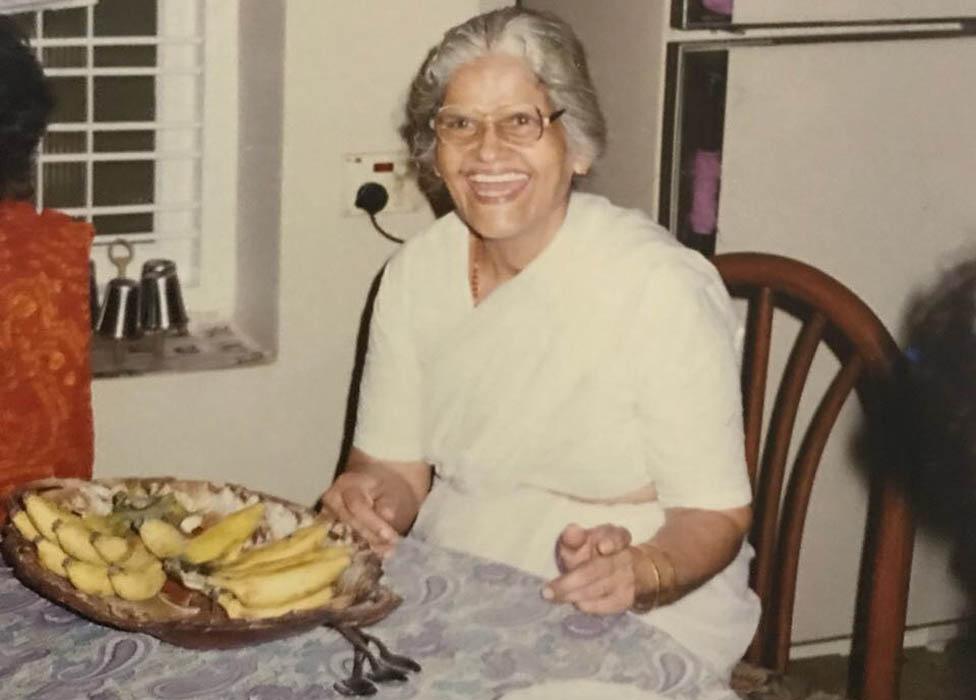
Megha Mohan's grandmother
Although still a sensitive subject in many Indian families, menstruation had never been taboo in mine - until an emotional reunion revealed a generational divide.
"Does anyone have a tampon?" I asked as I left the bathroom.
Several members of my family, who had been chatting animatedly over mugs of hot sweet tea, were abruptly silent. We were all packed in a modest hotel room in Rameswaram, an island off the South Indian state of Tamil Nadu.
The unnatural moment of stillness was instantly noticeable for two reasons - the sudden peal of rain beating against the windows, and the fact that there is rarely silence when my family, who live on three continents and talk every day on WhatsApp, get to be together.
My aunt, who had been lying casually on her hotel bed, stood up to reach for her handbag. She pulled out a sanitary towel and handed it over to me.
"This will tide you over until we can stop by a pharmacy," she said. And looking rather sadly at me, she added: "You know what this means, don't you?"
I didn't.
"You won't be able to come to the temple."
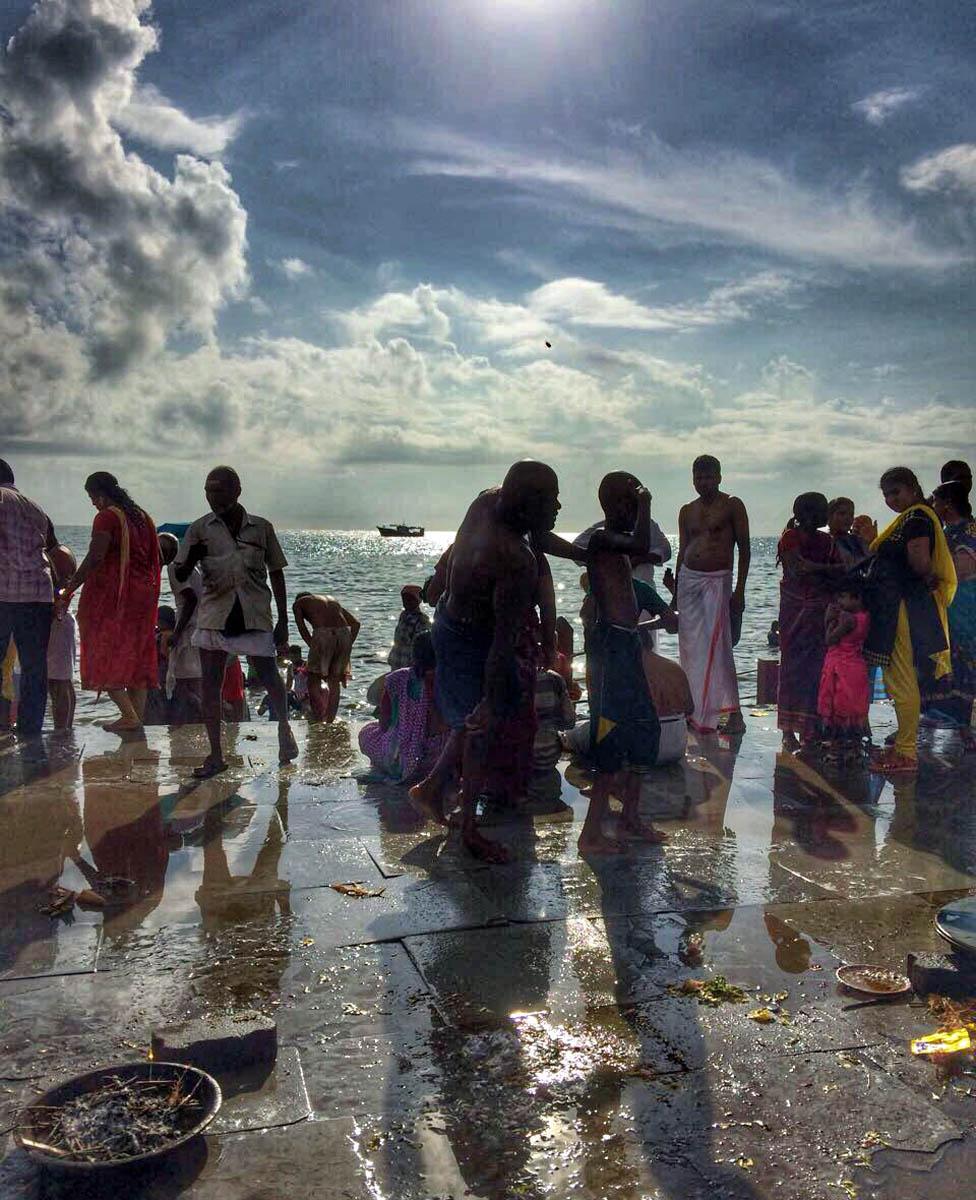
The "holy baths" at Rameswaram, where people take a dip to pay their respects to ancestors
Our family were not holidaying in Rameswaram. Although tourism and fishery are the two dominant industries of the 60 sq km (23 sq miles) island, we were there for a very specific and sombre reason.
It had been a year since the death of my beloved grandmother, the glue that kept our trans-continental family close.
On hearing the news of her death last December, we had all taken the next available flight to attend her funeral.
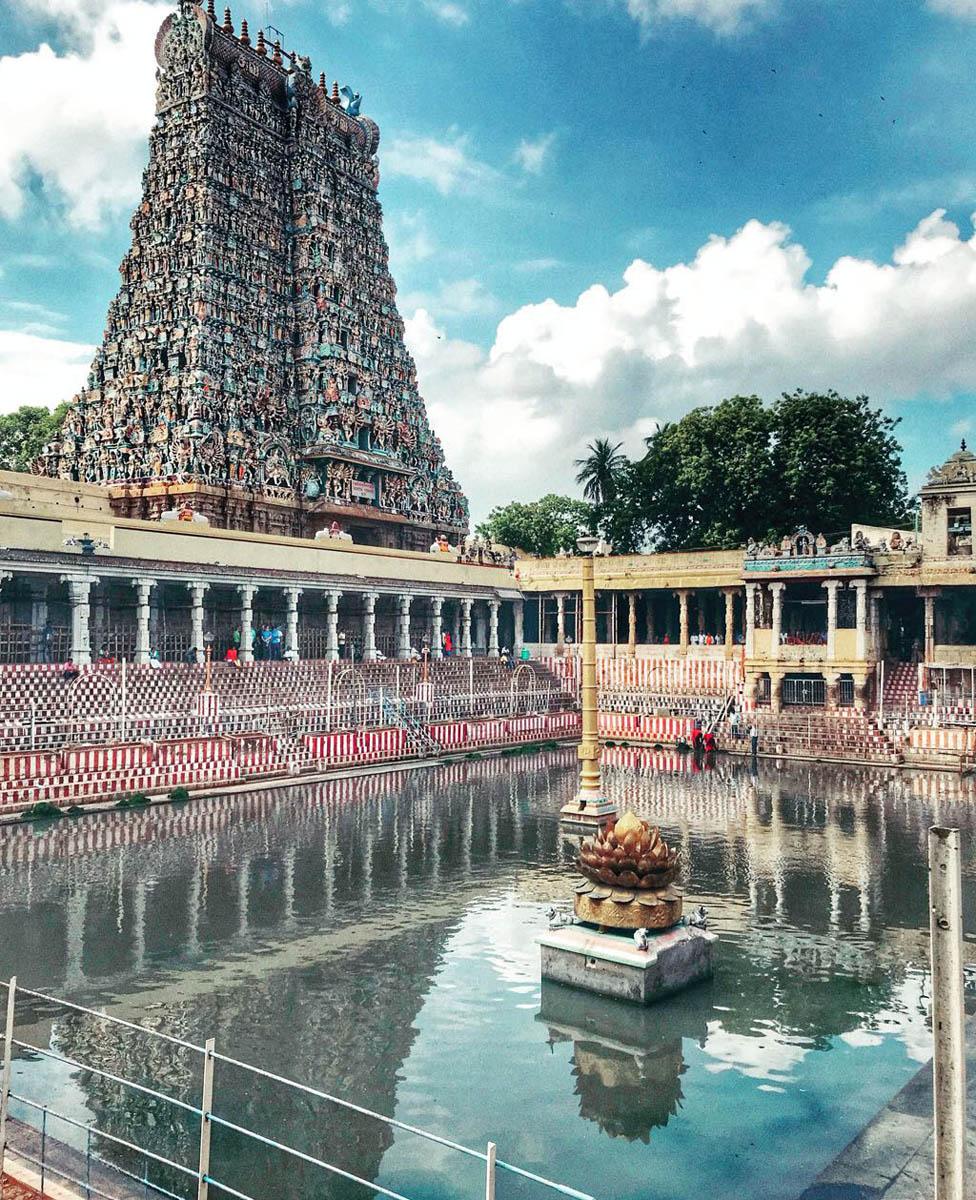
Tamil Nadu is a popular pilgrimage destination. A recent fire at Meenakshi temple destroyed dozens of shops
There are numerous traditions in Hindu culture surrounding death, depending on which part of India you're from.
My family observes a set of South Indian Hindu rituals for the death of someone close. We took her body back to our family home, wrapped her in white cotton, laid her on a large banana leaf and prayed together. The men took her body for cremation - a moment I wished I could have attended.
We hadn't eaten meat for 15 days after her death. We performed a special ceremony 90 days after.
We said our goodbyes to each other at the airport, promising that we would meet again for the next stage of the ritual, the final chapter of our mourning, at Rameswaram - a well-known Hindu pilgrimage site.
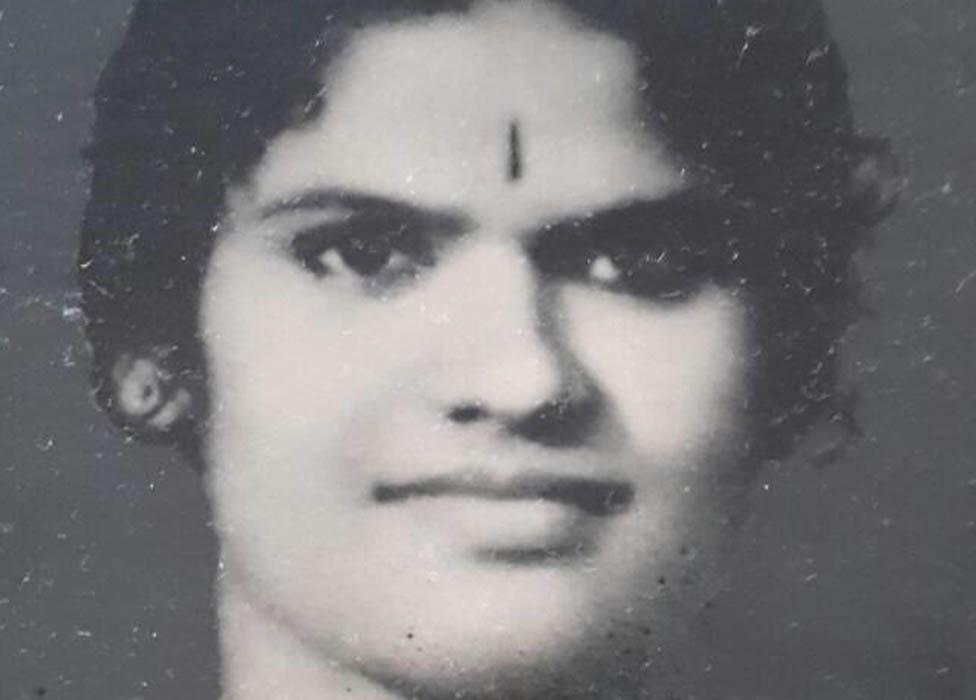
Megha Mohan's grandmother as a younger woman
It is where my grandmother performed the final rites when my grandfather died 36 years ago.
Rameswaram is famous for its historic temple, perched on the Bay of Bengal. Legend says that this was the place from where the Hindu god Rama built a bridge across the sea to Sri Lanka to rescue his wife Sita from her abductor.
At various points during the three flights and the bumpy car journey, I'd read about the long ornate corridors, sacred towers and huge engraved stone pillars, and how people came to Rameswaram at significant moments. I hadn't considered myself religious but it occurred to me that I was now also a pilgrim.
I'd thought a lot about Rameswaram and what the final chapter of saying goodbye would be like in the months following my grandmother's death.
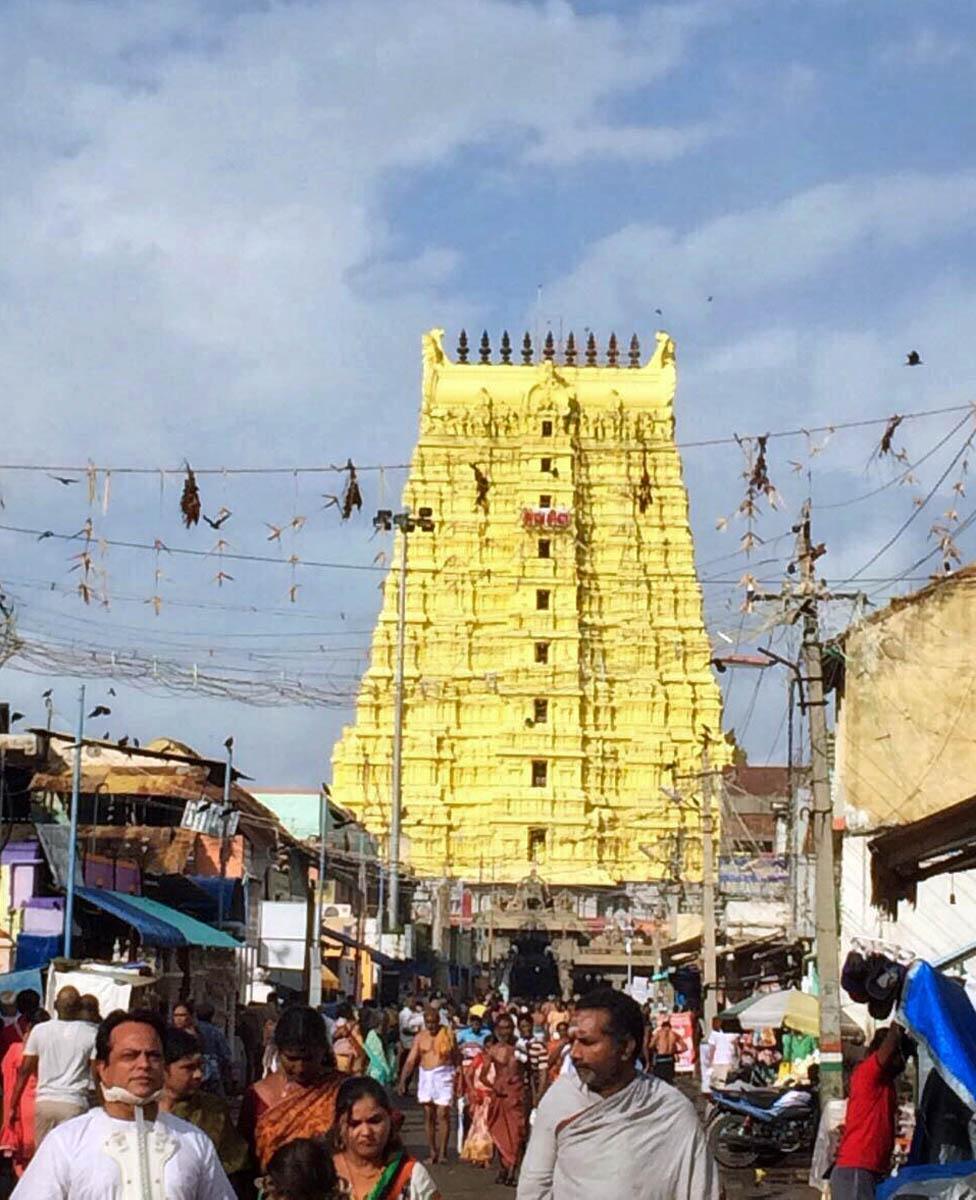
Rameswaram is one of India's most popular centres for Hindu pilgrimage
Back in my aunt's hotel room, holding her sanitary pad, having her tell me that I was now excluded from entering the the final part of our shared family mourning, I found myself on the defensive.
"You're saying I can't come to the temple because I'm on my period?" I asked curtly.
She narrowed her eyes swiftly enough for me to know that that tone hadn't been welcome in my youth, and most certainly wouldn't be tolerated in adulthood.
"I'm sorry," I conceded quickly. "But surely that's not what you're saying. You're not saying that I've flown all the way here to not be able to go with you inside the temple."
"It's not what I'm saying," she said. "That's just the way it is."
"Says who, though?" I pressed.
"It is the way it is. It is a big deal." The sentence was stern, indicating to everyone else in the room that it would not be wise to speak up in my defence even if they wanted to. They didn't. The decision was made.
I would be waiting with the driver outside the temple.

Find out more
From Our Own Correspondent has insight and analysis from BBC journalists, correspondents and writers from around the world
Listen on iPlayer, get the podcast or listen on the BBC World Service, or on Radio 4 on Thursdays at 11:00 and Saturdays at 11:30 BST

Growing up I'd been given a pass from family outings to the temple when I was menstruating. The reasons why varied.
One aunt had told me that it was tradition preserved from a time when women didn't have modern sanitary materials to absorb menstrual flow. My mother had told me that it was because it was the one time of the month where women were exempt from any duties, including household chores, a time when women could rest completely.
Speaking to academics recently, I found contradictory statements on exactly why women were excluded. One pointed to the Hindu practice of Chaupadi, where menstruating women are considered impure and unlucky during her period. Yet a priest told me that women are at their purest during their cycle and hence would be tainted by being exposed to others, even at a temple.

You may also like:

Dr Arvind Sharma, a professor of religion at McGill University in Montreal who specialises in the role of women in Hinduism, said the restriction has to do with concepts of ritual purity and impurity.
"There are certain times when human beings are considered ritually impure, as upon contact with a dead body, or excreta and so on. Women are considered so during periods," he says,
"It's hard to answer why as religious texts do not give reasons.
"The form of Hinduism we are talking about here is Smarta Hinduism, or the kind of Hinduism found in the Smritis (ancient Hindu texts). But in Shakta Hinduism (which is the body of Hinduism that celebrates the feminine, the Goddesses), menstruation is considered purifying rather than polluting."
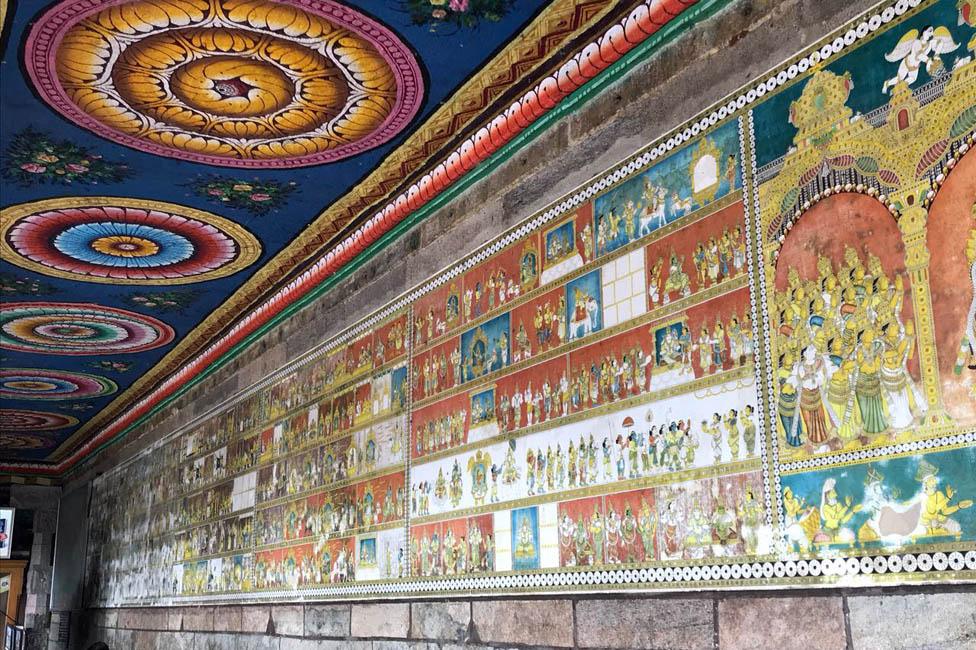
Menstruation has been a hot topic in India in recent years, with activists running missions to provide sanitary napkins to rural women.
Indian women have also challenged taboos attached to menstruation by staging social media campaigns using provocative hashtags like #HappyToBleed.
A recent Bollywood film Pad Man, which has been called the world's first feature film on periods, explored the subject.
The film is inspired by the life of Arunachalam Muruganantham, a Tamil Nadu-based social activist who campaigned to provide low-cost sanitary pad machines in rural parts of South India where few women have access to them.
The lead actor Akshay Kumar said: "I have lived with women all my life, yet I have learnt more about the topic while making this film than ever before. This is not the Stone Age - menstruating is natural."
All this played on my mind as I waited outside the temple, watching my family head through the gates.

The "corridor of 1,000 pillars" at Rameswaram
I reached for my phone to WhatsApp a female cousin, who couldn't make it to the final ritual. She sympathised with me, and then she paused typing for a few moments.
"You shouldn't have told them you were on your period," she wrote finally. "They wouldn't have known."
"Have you been to the temple on your period?" I asked.
"Most women our age have," she said casually, and contradicting my aunt's earlier statement just half an hour earlier, she added, "It's not that big a deal if no-one knows."
Follow Megha Mohan on Twitter @meghamohan, external
Join the conversation - find us on Facebook, external, Instagram, external, YouTube, external and Twitter, external.
